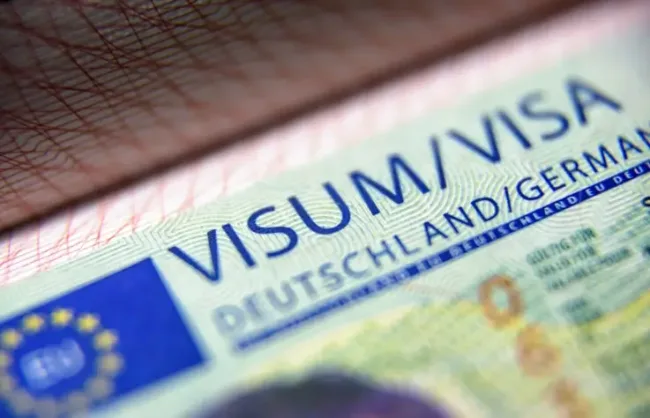
Welcome to Germany
Traveling to Germany? You may need a visa – find out if you do, which type, and how to apply so you can get the paperwork out of the way and focus on your trip.

What’s a Germany Schengen Visa, and who’s it for?
Who’s the Germany Schengen Visa for?
Travelers from over 100 eligible countries can apply for a Germany Schengen Visa.
Who’s not eligible for the Germany Schengen Visa?
-
Residents of the European Union and nationals of Schengen countries can travel visa-free within the Schengen Zone.
-
U.S. citizens previously denied visa-free entry to Germany or any other Schengen country.
What’s the purpose of the Germany Schengen Visa?
Enter and travel within 27 European countries that are part of the Schengen Area for:
-
Tourism and visiting family or friends.
-
Attending business meetings, conferences, or other business activities.
-
Short recreational courses or sports.
How long can you stay with a Germany Schengen Visa?
The visa allows a stay of up to 90 days per entry within 180 days in the Schengen Area. The visa is valid from 180 days to 5 years, determined by the embassy in accordance with your personal circumstances.
Learn more about the Germany Schengen Visa
What’s a Germany ETIAS, and who’s it for?
Who’s the Germany ETIAS for?
Travelers from countries that don't need a visa to visit Germany and other participating countries for short trips. Citizens from over 60 visa-exempt countries must apply for ETIAS authorization, including the United States, the United Kingdom, Canada, Australia, New Zealand, Brazil, Japan, and Singapore.
Who’s not eligible for the Germany ETIAS?
-
Citizens from countries needing a visa to enter the Schengen Area.
-
EU/EEA/Swiss citizens as they enjoy freedom of movement within the Schengen Area and don't need any visa or authorization.
-
Individuals with an outstanding entry ban or alert in the Schengen Information System.
-
Travelers who don't meet the security and entry criteria the ETIAS system determines.
What’s the purpose of the Germany ETIAS?
To pre-check travelers from visa-exempt countries before they enter participating countries, including Germany, for security reasons and to make the entry process quicker and easier.
How long can you stay with a Germany ETIAS?
The ETIAS authorization allows for short-term visits, typically up to 90 days within 180 days. It’s valid for multiple entries within 3 years or until the end of the validity of the passport registered during the application, whichever comes first.
What are Germany's long-term visa options?

Germany offers several long-term visa options for various purposes, such as employment, study, business, and residence. Here are some of the common long-term visas:
-
Germany Employment Visa: For those who accepted a job offer in Germany.
-
Germany Student Visa: For international students who've been accepted into a German educational institution.
-
Germany Training/Internship Visa: For training or internships in Germany.
-
Germany Family Reunion Visa: For joining family members in Germany.
-
Germany Job Seeker Visa: For individuals seeking a job in Germany.
-
Germany Visa for Guest Scientists & Researchers: For scientists and researchers invited by an institution in Germany.
-
Germany Freelancer Visa: For self-employed freelancers wishing to work in Germany.
-
Residence Permit: For long-term residency, work, or study in Germany.
Staying healthy in Germany: Here’s what you need to know
Healthcare facilities and standards in Germany can vary depending on the location and the type of facility. Here's what travelers should know.
Make sure to stay updated on routine vaccines
-
If you're arriving from a country at risk for Yellow Fever, proof of vaccination is necessary.
-
Keep updated with Germany's COVID-19 requirements, such as quarantine, testing, or vaccine certificates, through your airline or the German government website.
Medical facilities
-
Germany hosts a plethora of state-of-the-art medical facilities with cutting-edge technologies.
-
Both public and private hospitals are equipped with well-trained professionals.
-
It’s wise to familiarize yourself with the locations of healthcare facilities near your accommodation.
Health insurance
We’d always recommend taking out health insuran ce before you travel anywhere from any destination.
All the major cities in Germany will have private medical care, but it can be expensive. You should choose travel insurance with high coverage limits.
Contact your insurance provider before traveling to ensure you have the right level of coverage.
Other things to consider:
-
Trip cancellation, delay, and interruption benefits.
-
Medical expenses and medical evacuation benefits.
-
Baggage coverage.
Things to be aware of when visiting Germany
Keep an extra eye on the following to keep healthy and safe during your trip to Germany:
Ticks: Prevalent in wooded and grassy areas, ticks can transmit Lyme disease and Tick-borne Encephalitis (TBE). Protective clothing and repellents are advisable during tick seasons.
Medication for personal use
Follow these tips to bring into Germany some over-the-counter medicines:
-
Declare all medications: Report all medication for personal use to customs authorities.
-
Original packaging: Always keep medicines in their original containers and transparent bags in your hand luggage.
-
Prescription or doctor's letter: Present the medical prescription issued by your doctor or other competent authority in English.
-
Check for restrictions: Call Germany's embassy to verify that all of your prescription(s) are legal to bring with you.
-
Quantity aligned with itinerary: Bring only a reasonable quantity that aligns with the duration of your stay to avoid complications.


 India Visa
India Visa
 Turkey Visa
Turkey Visa
 United States Visa
United States Visa
 Australia Visa
Australia Visa
 Colombia Visa
Colombia Visa
 New Zealand Visa
New Zealand Visa
 China Visa
China Visa
 Egypt Visa
Egypt Visa
 Vietnam Visa
Vietnam Visa
 Indonesia Visa
Indonesia Visa


